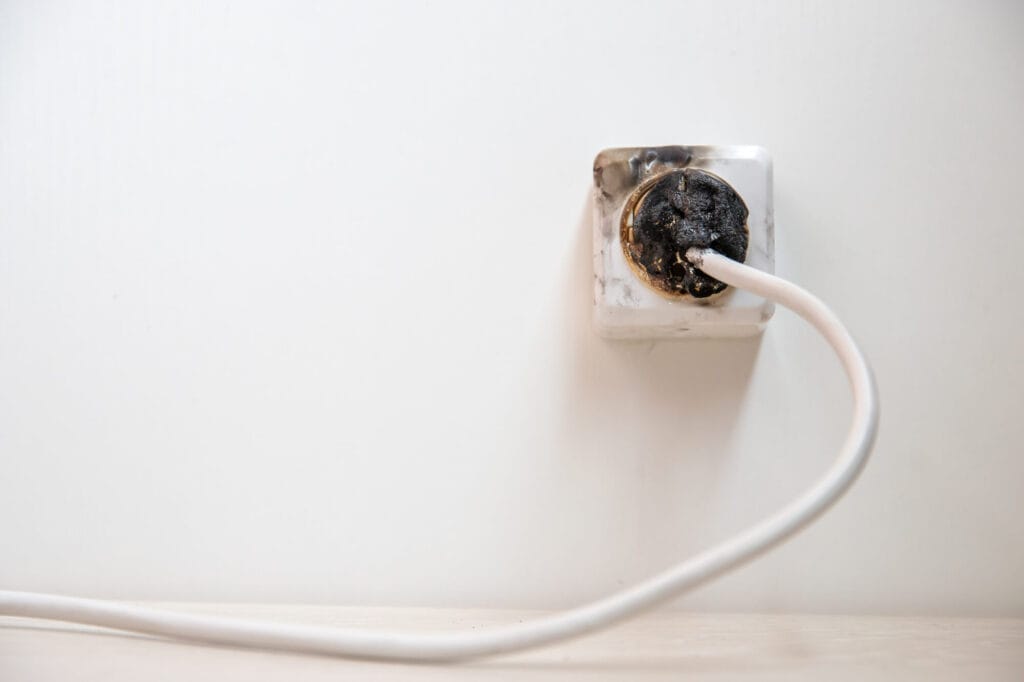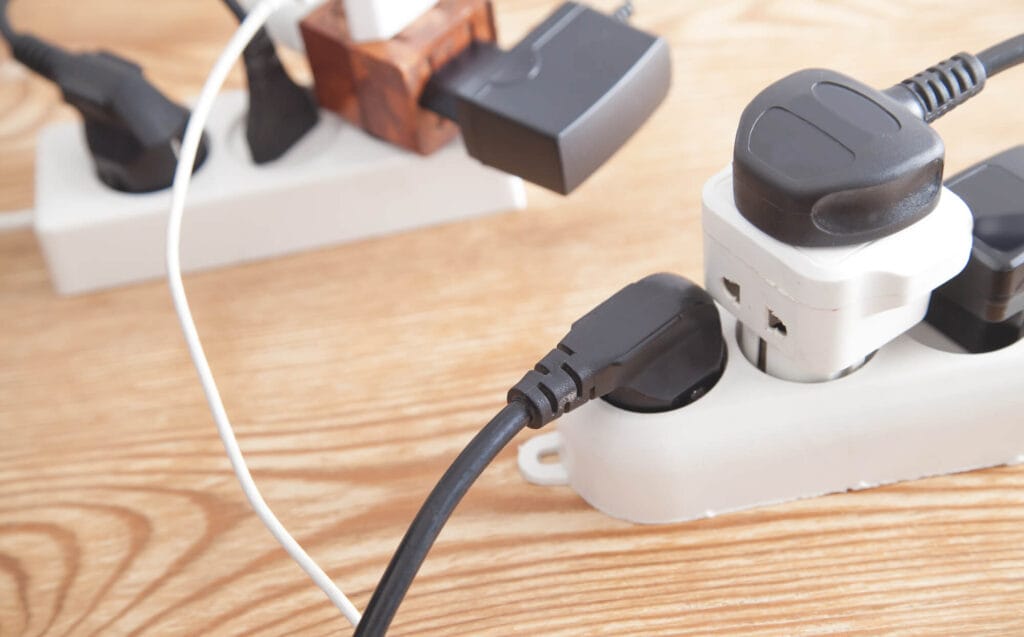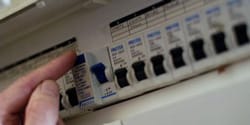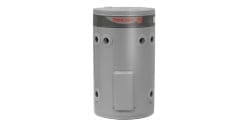What Is An Electrical Short Circuit
Our homes are powered by electricity, which gives us the comfort and ease we use daily. However, these systems have an overlooked danger that could happen: the short circuit.
Knowing short circuits, how to recognise them, and what to do when they occur can determine whether your home is safe or not.
This article is designed to help homeowners like you understand electrical short circuits and how to identify, avoid, and fix them.
Defining an Electrical Short Circuit
What Is A Short Circuit?
Short circuits are basically electrical circuits that let current run through them without any resistance. This could happen if the conductor breaks or if it touches something else conductor, like a metal item.
A complete circuit lets electricity flow smoothly from the source to the load and back again. A short circuit, on the other hand, skips the planned path and makes a straight line for the current to flow. An overvoltage could cause electrical fires, electrocution, equipment damage, or both.
Types Of Short Circuits
Normal short circuit
Some short circuits happen when a hot (powered) wire hits a neutral (not powered) wire. Right away, the resistance goes down, and the stream starts to flow in a different direction.
Ground fault short circuit
If a live or hot wire hits a grounded part of a box, device, appliance, outlet, bare ground wire, or anything else connected to the electrical circuit, this is called a ground fault short circuit.
What Causes Short Circuits?
A short circuit occurs when two conductors come into contact and form a gap. The electrical system could get too hot from this short, which could spark and start fires or other harm.
Some common reasons why short circuits happen in homes are:
Fittings That Are Leaking or Broken
If the coating on the neutral and hot wires is damaged, they could touch and cause a short circuit. Every so often, you should check your home’s wiring to ensure all the parts are in good shape. Also, ensure that any electrician you hire to work on your home is good.
Poorly Maintained Filters
Short circuits can also happen when air screens are dirty. The air’s dust and dirt can stick to the electrical wires and cause short circuits. You should always check your filters and change them every three months at the very least.
Cables And Appliances That Are Broken
Wiring that is worn out or broken can cause a short circuit. Replace any worn-out parts after routine inspections of all electrical appliances and wiring. It’s also important not to overload plugs or power strips, which can cause short circuits.
Wiring Errors and Frayed Connections
A short circuit can happen when wires touch each other because of loose links or bad wiring. For this reason, before doing any electrical repair on your home, you should always employ a certified electrician and double-check your wiring to ensure all connections are secured.


How to Tell If There Is a Short Circuit
Finding a short circuit in your home is important to keeping your electricity safe and avoiding possible problems.
Some signs and symptoms can point to a short circuit, which is a problem with the normal flow of electricity. If you notice these signs early on, you can quickly fix the problem and lower any risks.
To stay safe, here’s how to spot a short circuit:
Signs And Symptoms Of A Short Circuit
If you see any of these things, you probably have a short circuit:
Burn Marks Or A Burning Smell Coming From The Outlets
If the plug has burn marks or smells like it’s on fire, that could mean there is a short circuit. Usually, this is caused by a circuit that is too full. It could start a fire.
The Outlet Makes A Buzzing And Popping Sound
If you hear a buzzing or popping sound from the outlet, that’s another sign. This can also happen when a circuit is overloaded, which is a bad sign.
A Lot Of Sparks Coming From The Circuit
An electrical short circuit can also be seen when sparks come from the plug. When you see sparks, it means that the circuit has too much current running through it, which can be dangerous.
Safety Tips When Suspecting A Short Circuit
Disconnect the Power Source
If you think there is a short circuit in your home, turn off the power to the faulty area. Find the circuit breaker that controls the damaged circuit and turn it off to stop the power flow. This will prevent further damage and lower the chance of an electrical fire or injury.
Do Not Do Your Own Repairs
Looking into or fixing electricity problems might be tempting, but it is very dangerous without the right training and tools. Do not touch any exposed wires or try to fix the issue yourself. To safely find and fix the short circuit, you should instead get help from a trained electrician.
Unplug The Electronics
Simply unplug any electronics or appliances linked to the damaged circuit to keep the electrical system from overloading and lower the risk of more short circuits. This makes the electricity less likely to overload and helps find the problem’s cause.
Always Be Alert
Even after you’ve taken the first safety steps, keep an eye out for any ongoing signs of trouble, like smells of burning things or strange electrical activity. Keep a close eye on things, and don’t use broken outlets or switches until a professional fixes the problem.
The Dangers of Short Circuits
Electric short circuits can cause electrical fires or even death by electrocution, making them a major threat to both property and people’s safety.
A short circuit can create too much heat that sets things on fire nearby, quickly spreading the fire and causing property damage. Also, electrical parts that are damaged or have exposed wires make electric shocks more likely, which is very dangerous for people living there, especially children and pets.
Given the serious risks of short circuits, fixing them immediately is the only way to keep yourself, your family, and your property safe. If you wait to act when you think there is a short circuit, terrible things like fires or electrocution are more likely to happen.


Preventing Short Circuits in Your Home
There are many ways to keep your home from short-circuiting or getting too hot. The following are some of them:
Do Not Overload Your Sockets.
One of the easiest and most effective ways to prevent short circuits is to do this. Do not overload your power strips or plugs, as this can quickly cause them to short out.
Plan An Annual Inspection Of Your Electrical System.
A professional electrician should check your home’s electrical system once a year. This will help find possible short-circuiting risks and fix them before they become a problem.
During Storms, Use Less Electricity.
One of the main reasons for short rounds is strong winds and thunderstorms. Short circuits will likely happen when stormwater comes in touch with exposed wiring. If you can, use less energy during storms, and never use an electric appliance outside when it’s raining.
Check The Cords Of Your Appliances Often.
If you look at electrical equipment and see frayed cords or wires sticking out, you should replace them immediately. Cables left out in the open can short-circuit and damage or even start fires in your electrical system.
What to Do When You Have a Short Circuit
People usually know that an electrical connection has been broken when a circuit breaker trips. If you find a short circuit, do these things:
Locate The Short In Your Line And Shut Down The Circuit Breaker
One of the first things you must do is find the line’s end. The circuit switch needs to be turned off to do this. You can get to the wire giving you trouble once the switch is off.
Find Out What’s On The Circuit
Verify any electrical devices connected to the tripped circuit. Take precautions by safely disconnecting any devices that could be questionable. Reset the circuit breaker. If it doesn’t trip again, you’ve probably found the short circuit’s cause.
Fixed The Line That Was Shorted
Once you know where the wire is, you can fix it. You may need to cut the wire or insert a new one to do this. You might want to hire an electrician if you are unsure how to do this.
When You Should Hire a Professional Electrician
Although you might be able to tell when there is a short circuit, only trained professionals should try to fix the problem at its source. Call a professional electrician if you can’t determine where the short circuit is coming from or if the problem keeps happening.
Professional electricians have the knowledge, tools, and experience to safely find and fix electrical problems in your home. Do not try to fix things yourself, as this can put your safety at great risk and worsen the problem.

Professional Solutions for Short Circuits
Getting help from a professional is very important when dealing with short circuits. Licensed electricians have the skills, knowledge, and tools to safely find and fix electrical problems.
Homeowners can expect thorough inspections, accurate diagnostics, and reliable solutions tailored to their needs. Investing in professional electrical services ensures the long-term safety and functionality of your home’s electrical system.
For expert electrical services on the North Shore, Northern Beaches, Eastern Suburbs, Hills District and Ryde. We provide comprehensive solutions for short circuits and other electrical issues, ensuring the safety and reliability of your home’s electrical system.
Conclusion
Electrical short circuits are a potential hazard lurking within our homes, but their risks can be minimised with awareness and proactive measures.
Homeowners can prioritise electrical safety and protect their households from harm by understanding what constitutes a short circuit, how to identify one, and the importance of prompt resolution.
Remember to practice preventive measures, remain vigilant for signs of trouble, and always prioritise creating safer homes for ourselves and our loved ones.



